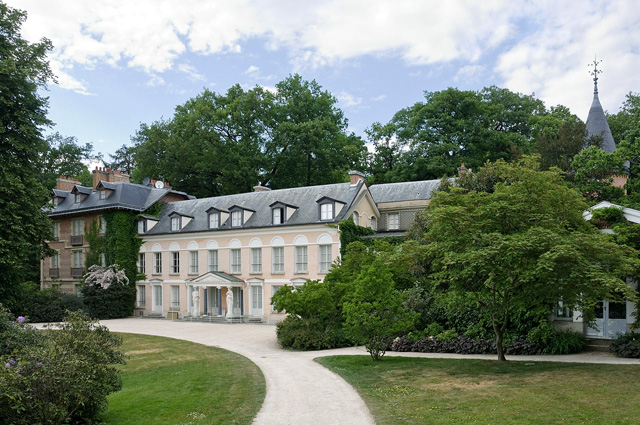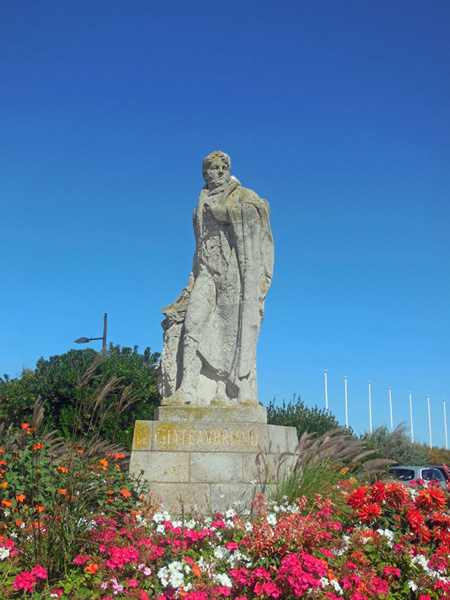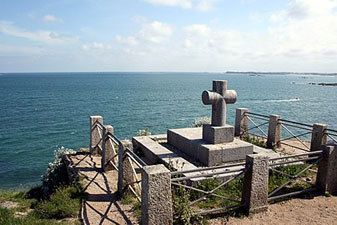 |
| The Independent Traveler's Newsletter PAGE FOUR |
 |
| The Independent Traveler's Newsletter PAGE FOUR |
|
DID YOU
KNOW? The
French army
was the first to use camouflage in 1915 (in
Chateaubriand was very interested in the reasons for the Revolution that took the lives of many of his family members and friends. Prior to his romantic literary endeavors, he wrote Essai sur les Révolutions to try to explain its causes. He had drifted away from the Catholic religion but returned to it at the end of the 18th century. He was able to return to France from exile during an amnesty and became famous for a book whose English title was The Genius of Christianity. and this work contributed to a religious revival in France following the Revolution. He also became a favorite of Napoleon Bonaparte who wanted to win the approval of the Catholic church. He was appointed him secretary of the French legation to the Holy See. He resigned in anger after Napoleon ordered the execution of Louis XVI's cousin the Duc d' Enhein in 1804, finding himself totally reliant on his literary success. He unexpectedly received a great deal of money from the Russian Tsarina, Elisabeth, due to her admiration of his defense of Christianity and was able to live quite well. In 1806 he traveled to Greece, Egypt, Tunisia, Spain, Asia Minor and Palestine taking notes on his adventures which later became Les Martyrs, about the Roman persecution of early Christianity.  When he returned to France, he wrote a scathing criticism of Napoleon who threatened to have him publicly tortured, but instead he banished Chateaubriand from Paris where he settled at a small estate he named La Vallée aux Loups south of Paris at Châtenay-Malabry. He and his wife, Céleste, who had been separated for the 12 previous years, lived at what is today known as Maison de Chateaubriand from 1807 to 1817, where they spent much time enhancing the park with trees that reminded the author of his travels: American cypress, Greek plane trees, cedars of Lebanon, Jerusalem pines. He once said that the trees were his only family, and he wanted to die near them. It was here where he was at peace and began his Memoirs Beyond the Grave (Mémoirs d'Outre-Tombe), an autobiography. "Washington
and Bonaparte emerged from the womb of democracy, both of them
born to liberty, the former remained faithful to her, the latter betrayed her." The author had many friends, especially in literary circles, who visited him at the estate quite often. In fact, Napoléon visited the home once when Chateaubriand was absent. In 1811, during his decade at the estate, he was elected to the Académie Française, but as a staunch Royalist and critic of the Revolution, he waited to take his seat until the Bourbon Restoration. "I will be Chateaubriand or
nothing."
~ Victor Hugo at age 15
Maison de Chateaubriand in
Châtenay-Malabry
Chateaubriand became an important participant in politics and was a strong Royalist between 1824 to 1830. Even during his time at his estate, he wrote a pamphlet entitled De Buonaparte et des Bourbons of which thousands of copies went into circulation, expressing his dislike of Napoléon. He was often in trouble for his viewpoints, and after Napoléon's defeat, he became a peer of France and state minister. He was the French ambassador to Sweden for 17 months until 1815, and by 1821 he served as ambassador to Prussia, the United Kingdom in 1822 and advanced to Minister of Foreign Affairs from 1822 to 1824. Falling out of favor with various groups he supported, he became a strong defender of freedom of the press and Greek independence from the Ottoman Empire between 1821 and 1830. King Charles X made him ambassador to the Holy See where he served from January 1828 until August of 1829, but he resigned in 1829 upon Charles' appointment of Prince Jules de Polignac as Prime Minister, moving from there to become a minister to Valais in Switzerland. Also a staunch Royalist, Polignac with other ministers issued the Four Ordinances which it is believed led to the July Revolution of 1830. One of the points of the Four Ordinances was to suspend the liberty of the press. The people revolted and this led to the abdication and exile of Charles X, last of the Bourbons. "It is
by the freedom
of the press that the rights of the citizens are preserved, that
justice is done to each according to his merit.
It is the freedom of the press, whatever can be said, which at the time of the society in which we live is the strongest support of the throne and the altar." King
Louis-Philippe (Louis-Philippe d'Orléans, a cousin of
Charles) assumed the throne and would reign for 18 years.
However, Chateaubriand refused to swear allegiance to the new
king, and he left political life to complete his Mémoirs
d'Outre-Tombe, that was published in two volumes
posthumously. It emphasized his pessimistic view of the world
which colored his everyday life, and some people saw him as melancholy
and
bitter.
 A reviewer
of his Mémoirs d'Outre-Tombe wrote that Chateaubriand was an
outspoken critic of Napoléon during the Empire, he rallied to
the cause of the restored Bourbon monarchy and served in a number of
high offices including foreign minister. He added, "With such a dramatic life, it's no wonder
that one of Chateaubriand's most enduring works is his memoirs .
. . If Byron had been lucky enough to be born in France rather than
puritanical England, he might well have ended up with Chateaubriand's
career." A reviewer
of his Mémoirs d'Outre-Tombe wrote that Chateaubriand was an
outspoken critic of Napoléon during the Empire, he rallied to
the cause of the restored Bourbon monarchy and served in a number of
high offices including foreign minister. He added, "With such a dramatic life, it's no wonder
that one of Chateaubriand's most enduring works is his memoirs .
. . If Byron had been lucky enough to be born in France rather than
puritanical England, he might well have ended up with Chateaubriand's
career."Chateaubriand spent his final years as a recluse in his Paris apartment on rue du Bac where he was encouraged to write a biography of Armand Jean le Bouhillier de Rancé, a 17th century French aristocrat who also withdrew from society and was the founder of the order of Trappist monks. The lives of the two men were very similar. At his Paris apartment Chateaubriand wrote: "As I write these last words, my window, which looks west of the gardens of the Foreign Mission, is open: it is six in the morning. I can see the pale and swollen moon, it is sinking over the spire of the Invalides, scarcely touched by the first golden glow from the East; one might say that the old world was ending, and the new beginning. I behold the light of a dawn whose sunrise I shall never see. It only remains for me to sit down at the edge of my grave, then I shall descend boldly, crucifix in hand, into eternity."  Chateaubriand died in Paris on July 4, 1848, during the Revolution, and was buried, as he had requested, on a particular tiny island off Saint-Malo where he had played as a child. The author requested permission for his burial place to be on the western end of the islet Grand Bé from the mayor of Saint-Malo on the eve of his 60th birthday, but his request was denied. Chateaubriand's Tomb on Grand Bé Chateaubriand statue in Saint-Malo "A great French
writer wanted to rest here to hear
only the wind and the sea. Please respect his last will." An admirer of his named Malouin intervened with the new mayor in 1831, and his request was granted. On a plaque next to his tomb. which was erected in 1838, ten years prior to his death, is the preceding inscription. WHERE TO STAY IN BRITTANY:  In the Ille-et-Vilaine département consider Château de la Foltière and its 24 amazing botanical gardens, and Château de la Ballue with its sculpted classical gardens and frequent concerts in their parc. We recently stayed at each of these lovely châteaux and enjoyed every minute including exploring the surrounding countryside.  Also in Brittany is the relaxing and beautiful Domaine de Moulin Mer in Finistère along a rugged coastline evoking the adventurers who sailed from its shores. The largest population center is Brest, and Quimper, Morlaix, and Douarnenez are all worth a visit. The island of Ushant (the northwestern most place in France) also known as Ouessant, can be visited by boat. Our stay in Finistère was unlike any other as Finistère is unique (in a very good way), and we have only happy memories of our days on the coast and at the Domaine.  UNREST IN FRANCE We cannot close this newsletter without mentioning the Yellow Vest protests in the cities of France, especially destructive in Paris, that started as peaceful demonstrations that outside groups infiltrated to bring violence and mayhem for (so far) five weekends in a row. This, the fifth weekend, has half the number of protesters on the streets and is somewhat quieter. Once the President of France began addressing their original complaints (gas tax hikes and tax breaks for the wealthy) the protests didn't subside, creating the notion that some protesters were not sincere about their purpose and were, perhaps, enjoying the chaos they were causing and the attention they were getting. This is only our viewpoint, of course, but we think it is not without merit. He has also announced wage increases for the poorest workers and tax cuts for pensioners. One of our friends in France, who lives in the southwest but is not a French native, wrote how the country as we know it today began with a revolution (as did the United States) and added, "Although there may remain this Revolutionary fiber in the French people, we mustn't forget that France is a country of civilization and great thinkers. Therefore, I am convinced that this unrest will pass." We have confidence that he is correct. Over, the years, however, protesters taking to the streets of France have been quite successful in getting what they want. Worse is the murderous rampage in Strasbourg, one of our favorite French cities, at the Christmas Market on December 11th ~ an attack on innocent people. Sadly, a fourth victim has died. The perpetrator was located by French police in the city late on December 13th, and, after drawing his gun on them, he was shot and killed. We will let neither of these events deter us from visiting France. These days, sadly to say, danger is everywhere as hate and anger define so many people. We hope that you will continue to include France in your travel plans.
DISCLAIMER: You have received this newsletter because your email address is on our Opt-In mailing list, i.e., you have requested to receive FRANCE On Your Own ©. If you would like to discontinue receipt of this newsletter, please send an email to publisher@franceonyourown.com with "unsubscribe" on the Subject line. Unless indicated otherwise, photos, graphics, artwork and text in the FRANCE On Your Own © newsletter are all the property of Cold Spring Press and FRANCE On Your Own © and cannot be copied, duplicated or used in any manner by anyone without the express written permission of Cold Spring Press. FRANCE On Your Own © is published online by Cold Spring Press, P O Box 26098, San Diego, California 92196-0098. This publication is copyrighted and no portions of the text, artwork, graphics or photographs may be reproduced or distributed in any form or by any means or stored in a database or retrieval system without the written permission of the Publisher. For more information about FRANCE On Your Own ©, visit our web site at http://www.franceonyourown.com. Recommendations made in this newsletter are based upon the personal experiences of the Publishers or contributing writers solely to provide information to subscribers. Cold Spring Press and FRANCE On Your Own © make no endorsements nor are any guarantees or promises of satisfaction given or implied. Any and all information is correct to the best of our knowledge, and the Publishers accept no responsibility for errors and/or omissions. The responsibility lies entirely with the traveler to obtain current information regarding accommodations, availability, schedules, prices, reservations, or any other pertinent details. We do not guarantee the historical accuracy of the contents of articles in this newsletter. Historical accuracy is dependent upon one's sources of information -- and contradictions often exist among those sources. Links to other web sites or email addresses are provided for informational purposes only and do not imply any guarantees of service or endorsement of any organization or their business practices. FRANCE On Your Own © is electronically transmitted via email. To add your email address to our database for this FREE newsletter, send an email to info@franceonyourown.com, and please put Subscribe in the subject line. We do not share email addresses with any other organization. BACK ISSUES of the print version of FRANCE On Your Own © and Free online back issues are available on our web site at http://www.franceonyourown.com/Archives.htm. ©1997-2018
Cold Spring Press All Rights Reserved
|
|
 previous
page
previous
page |